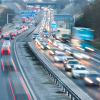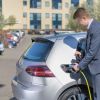I learned the basics of driving from the back seat watching my parents. My Father’s style of driving at the helm of our Rover SD1 was breathtaking enough but it was the chain of cigarettes that left me light-headed. Nobody knew about the effects of second hand smoke back then.
The latest menace is the ubiquitous mobile phone. You’re enjoying your Sunday roast when an in-law, oblivious to your calls to pass the carrots, starts watching football, texting or posting drivel. Your mouth opens involuntarily: “what are you doing?” All eyes swivel in your direction and your next remark guarantees that there won’t be any more family lunches for a long time, at least not while you’re in town.
We have evolved into the two camps of the frustrated and of the entitled. If we’re honest, we probably spend some time in both camps. This year’s RAC Report on Motoring identifies irresponsible and hazardous behaviour in other drivers as the primary concern amongst other motorists, with drivers using handheld phones topping the list of concerns.
If you can walk and chew gum at the same time then you can probably place a call via handsfree Bluetooth without crashing into a tree. So you send a text next time and there’s still no tree to greet you… But chance is a numbers game.
Try timing yourself with a stopwatch and see how long it takes to select the app and type “home in 10 mins.” In five seconds, and I defy to type faster, at just 40 miles per hour you travel the length of a football pitch with your eyes effectively closed. With more vehicles on the road than ever before, the consequences don’t bear thinking about.
Despite the rise in traffic density over the years, public transport really hasn’t kept up with demand, though its cost has skyrocketed. Frustration is finding its vent in the form of tailgating and aggressive behaviour while courtesy has taken a back seat. Nearly half of drivers in this year’s RAC Report on Motoring have witnessed verbal abuse on the roads in the past year, with nearly a third observing some kind of physical confrontation.
While from a public transport point of view HS2 dominates the headlines, a quiet revolution in common sense is seeing a resurgence in the local and rural rail routes that were closed in the 1960’s. That and the new national bus strategy should alleviate the woes of inching along in dense traffic while pumping fumes into urban areas. It will also be a lifeline for urban communities who have become increasingly dependent on their cars as their only means of transport. Taken as a whole, over a third of drivers have become more, not less, dependent on their cars in the past year.
2019 marks the moment that automotive technology stepped up to the mark to reduce emissions. Diesel NOx emissions have fallen 84% since 2000 and modern diesel engines filter out 99.9% of the worrisome particulate matter while producing 15% less carbon than petrol motors. The dawn of electric is upon us with nearly every car manufacturer unveiling their take on the car of the future. But these cars won’t drive themselves and while there are giant leaps in technology taking place it is the device in our pockets that continues to pose a real danger to more than just my Sunday lunch.
As ever the RAC Report on Motoring report highlights the changing trends that affect every single one of us, because everyone is a road user in one sense or another. We are all in this together and there are nuggets of information in this report that will help you to improve your journey as well as those around you.
Find out more about Ben at bencollins.com.



